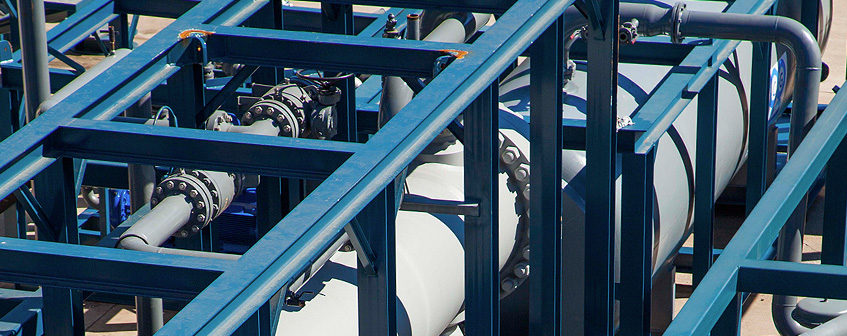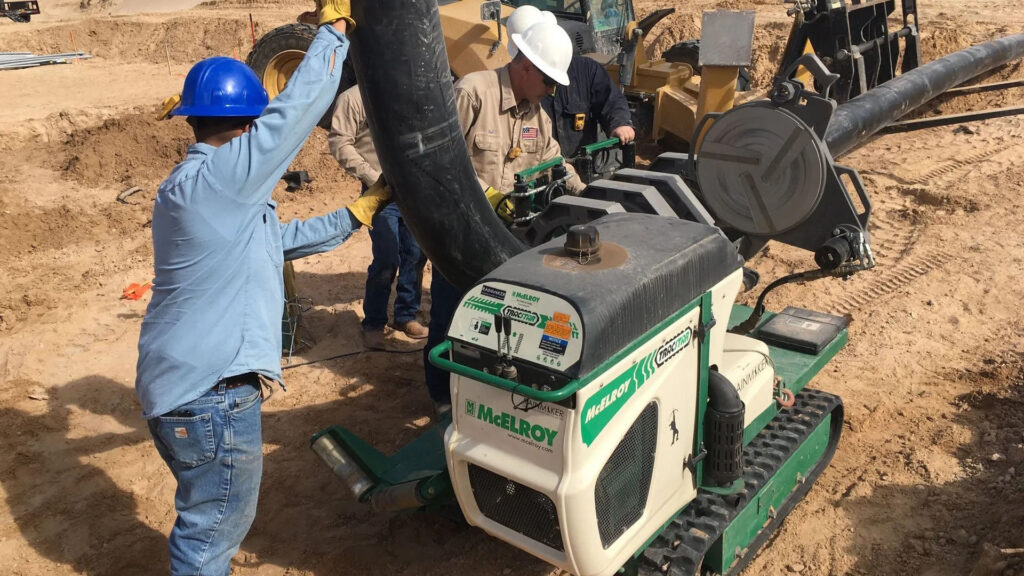A Comprehensive Overview to the Numerous Kinds Of Oil Field Equipment and Pipeline Equipment Available
The oil and gas industry relies heavily on specialized equipment for reliable removal and transport. Various kinds of machinery, from drilling rigs to tank, play essential duties in this complex process. Each tool serves distinct features that add to total functional success. Understanding these components is necessary for any person associated with the field. As the sector advances, so as well do the technologies that support it. What improvements are on the horizon?

Drilling Rigs: The Backbone of Oil Exploration
Drilling rigs serve as the essential equipment in the domain of oil expedition, allowing business to accessibility hydrocarbon books hidden deep beneath the Planet's surface. These rigs can be found in different types, consisting of land rigs, offshore rigs, and mobile systems, each developed to run in specific atmospheres. Equipped with sophisticated modern technology, drilling rigs can pass through geological formations with precision, guaranteeing effective source extraction. The architectural integrity and functional abilities of these rigs are important, as they have to endure severe problems and substantial pressures. Moreover, the choice of a boring gear influences the overall project price and timeline, making it a crucial consideration for oil firms seeking to maximize their exploration initiatives and maximize efficiency in their procedures.
Pumps: Vital for Fluid Movement
In the oil extraction process, the role of pumps is significant, helping with the motion of fluids throughout various stages of production. Pumps are essential for carrying crude oil, water, and other liquids from below ground storage tanks to the surface area and after that with pipes to refineries. They can be found in numerous types, including centrifugal, favorable variation, and submersible pumps, each offering certain functions based on the liquid attributes and operational requirements. Centrifugal pumps are generally utilized for their effectiveness in high-flow applications, while positive variation pumps succeed in dealing with viscous liquids. The choice of pump influences general efficiency, functional safety and security, and maintenance prices. Proper selection and maintenance of pumps are crucial for enhancing production and lessening downtime in oil area procedures.
Valves: Controlling Circulation and Pressure

Shutoffs play an essential duty in taking care of the flow and pressure of liquids within oil areas and pipelines. Various kinds of shutoffs offer unique applications, each created to fulfill certain features fundamental for effective operation - Superior Oilfield Rentals Texas. Understanding the qualities and uses of these shutoffs is vital for maximizing system efficiency and safety and security
Kinds of Valves
Crucial parts in oil area procedures, shutoffs play a crucial duty in managing the circulation and stress of liquids within pipelines and devices. Numerous sorts of shutoffs are used to fulfill the varied requirements of oil and gas production. Typical types consist of entrance shutoffs, which supply a straight-line circulation and very little pressure decline; globe shutoffs, known for their throttling capacities; and ball valves, acknowledged for their fast on/off control. Additionally, check valves protect against backflow, while butterfly shutoffs use a light-weight option for controling flow. Each valve kind is designed with certain materials and configurations to withstand the rough conditions commonly discovered in oil areas, making certain dependability and efficiency in operations. Comprehending these kinds is important for effective system management.
Valve Applications and Functions
While different kinds of valves serve unique purposes, their key applications rotate around managing flow and pressure within oil and gas systems. Valves such as entrance, world, and sphere shutoffs regulate liquid movement, guaranteeing peak performance and safety. Gateway shutoffs are typically used for on/off control, offering marginal circulation resistance. Globe valves, on the various other hand, deal specific circulation law, making them suitable for throttling applications. Ball valves are preferred for their quick operation and tight securing abilities. Additionally, stress relief shutoffs are vital for preventing system overpressure, securing tools integrity. Generally, the proper choice and application of valves improve functional efficiency, making certain the trusted transportation of oil and gas with pipes and processing facilities.
Compressors: Enhancing Gas Transportation
Compressors play a crucial function in the reliable transportation of gas, making certain that it moves smoothly via pipelines over fars away. These devices boost the stress of natural gas, allowing it to overcome friction and altitude changes within the pipeline system. In addition, compressors facilitate the balancing of supply and need, fitting changes in usage and production rates. Numerous sorts of compressors are employed in the industry, including centrifugal, reciprocating, and rotating screw compressors, each offering distinctive benefits based upon the operational demands. Normal maintenance of these compressors is important to take full advantage of effectiveness and lessen downtime, inevitably adding to a dependable gas transportation network. Their crucial function highlights the value of compressors in the general oil and gas facilities.
Storage Tanks: Safe and Efficient Fluid Monitoring
Reliable transport of gas counts on numerous supporting systems, among which is the correct administration of tank. These storage tanks play a vital role in securely consisting of fluids, ensuring that functional efficiency is kept while lessening environmental dangers. Constructed from sturdy materials, they are designed to hold up against high pressures and harsh aspects. jetting sewer line Properly sized and purposefully located, storage space tanks help with the smooth flow of gas and other liquids, preventing traffic jams in supply chains. Routine maintenance and tracking are necessary to spot leakages or architectural problems, promoting safety and security and conformity with regulatory requirements. Inevitably, the effective administration of storage space tanks is critical for the overall stability and reliability of the oil and gas market's liquid handling systems.
Pipeline Solutions: Framework for Transportation
Pipeline systems act as the foundation of the oil and gas industry, helping with the efficient transportation of hydrocarbons over huge ranges. These systems are composed of different elements, consisting of pipelines, shutoffs, pumps, and compressors, all meticulously developed to ensure seamless circulation. The materials made my company use of in pipeline building and construction, often steel or high-density polyethylene, are selected for longevity and resistance to deterioration. Pipeline networks can cover across land and water, connecting manufacturing sites to refineries and distribution facilities. In addition, advanced technology makes it possible for real-time tracking of circulation prices and pressure levels, improving functional performance. The strategic placement of these pipes minimizes ecological influence while optimizing source access, therefore playing an essential duty in conference power demands worldwide.
Security Equipment: Guaranteeing Worker and Environmental Management
The procedure of pipeline systems, while crucial for energy transportation, likewise presents significant safety challenges for workers and the setting. Safety and security devices plays a considerable function in reducing these threats. Individual safety tools (PPE) such as headgears, handwear covers, and non-slip footwear safeguards workers from physical hazards. Additionally, gas discovery systems check for leakages, guaranteeing that damaging substances do not position a risk to employees or the surrounding community. Emergency situation closure systems are crucial for swiftly halting procedures during a situation, stopping potential catastrophes. Spill containment materials, consisting of absorbents and barriers, are my sources basic for reducing environmental effect. Overall, purchasing all-encompassing security equipment is important for maintaining operational honesty and protecting both employees and the setting in the oil and gas sector.

Often Asked Inquiries
How Do I Select the Right Oil Field Equipment for My Job?
Selecting the ideal oil field tools includes assessing project specs, budget plan restrictions, and operational needs. Think about variables such as devices reliability, compatibility with existing systems, and the provider's reputation to assure peak efficiency and safety.
What Are the Upkeep Demands for Oil Field Equipment?
Maintenance requirements for oil field equipment consist of normal inspections, lubrication, and prompt fixings. Operators needs to additionally stick to supplier standards, screen performance metrics, and guarantee compliance with safety policies to enhance long life and efficiency.

Just How Can I Make Sure Compliance With Environmental Laws?
To ensure conformity with environmental policies, companies must conduct routine audits, implement finest practices, purchase training, maintain appropriate paperwork, and remain upgraded on regulations (Superior rentals squeeze tools). Cooperation with ecological firms can likewise improve adherence to policies
What Is the Average Lifespan of Pipeline Equipment?
The typical life expectancy of pipeline tools typically ranges from 20 to 50 years, depending upon aspects such as material top quality, environmental conditions, and upkeep methods. Normal examinations can significantly affect durability and functional effectiveness.
Exactly how Do I Securely Deliver Oil Field Equipment to Remote Locations?
Delivering oil area tools to remote areas calls for mindful preparation, consisting of course analysis, safeguarding permits, using appropriate vehicles, and ensuring safety procedures are adhered to. Appropriate training and communication among crews are essential for successful transport.